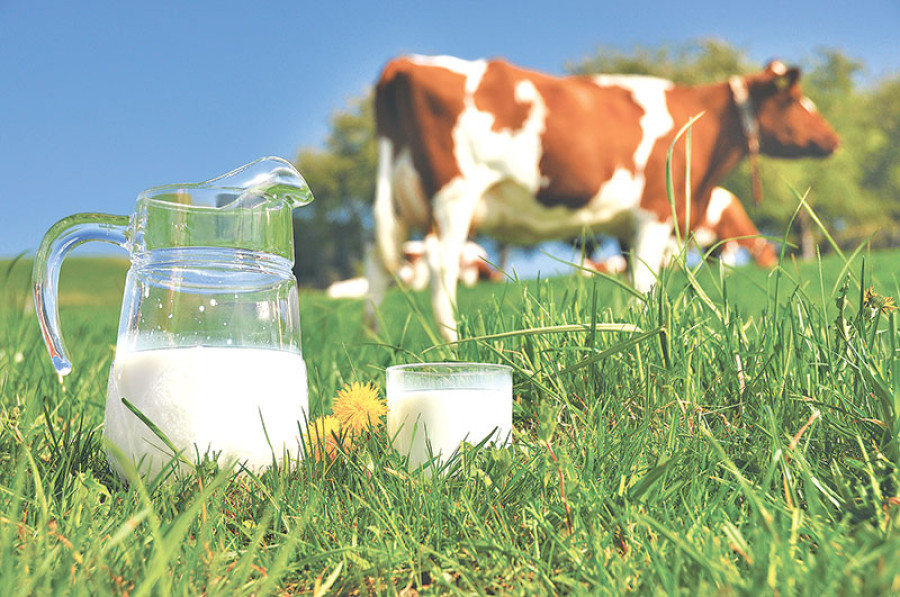Opinion
Milking strategy
Despite sufficient dairy technicians, the DDC is neither running in profit nor has strategic vision for management
Nanu Jha
Dairy farming practice has been growing as a family business in the rural areas of Nepal for centuries. When there were no dairy enterprises, demand of milk was fulfilled by raising cows/buffalos by majority of the farming families themselves or by direct supplying milk to consumers from producers. These producers used to go door to door to deliver required quantity milk to consumers. During those periods some traditional professionals prepared curd filled in clay containers and sweets in traditional way and sold them in the hat bazars. Rapid urbanisation and massive migration of people from rural to urban in search of better opportunities has its positive impact on dairy farming as well. As a result, the demand of milk and milk products have been increasing at a faster rate in the recent years.
The DDC
Despite high potentials for the development, this sector has not been able to meet the domestic demand of milk and milk products. Moreover, billions of rupees are going out annually in importing milk and milk based products. Dairy development activities took root when first time a cheese factory established in Langtang in Rasuwa district under the assistance of Food and Agriculture Organization (FAO) in 1953. Later a small scale milk processing plant was set up for experiment in Tusal of Kavre Palanchowk district and a dairy development section under the department of agriculture in 1954. After few years (in 1956), a milk processing plant was established in Lainchaur, Kathmandu with financial assistance from New Zealand and technical cooperation of Food and Agriculture Organization (FAO). And in 2021 B.S. the government of Nepal established Dairy Development Corporation (DDC) to guarantee market to milk producers to sell their milk at cost price to corporations and supply pasteurized milk and milk products to consumers.
The corporation has flourished nationwide with an annual collection over 60 million litres of milk from more than 75 thousand milk producers through 888 milk cooperatives spread out in 33 districts. The corporation has eight modern dairy plants, 11cheese manufacturing units, 45 milk chilling plants and sufficient dairy specialists. It is a valuable institution for the economic development of the country but currently, it is unable to meet the increasing demand of milk and milk based products owing to lack of strategic supply management within the corporation. Despite the big infrastructure, sufficient dairy technicians and also high annual turn over, the corporation is neither running in profit nor has products promotion strategic management to substitute the dairy products importation.
The government has established department of livestock services for the growth and development of livestock sector. It has strong network of extension and several organisations and programs responsible for the development and quality control of the livestock sector across the country. The public extension services including dissemination of technology, information and training for increasing livestock products production, income generation and sustainability, are conducted by all its districts office. Similarly, Dairy Development Policy 2008 is the most specialised policy document for the development of dairy enterprises in the country. The policy has given important responsibilities to National Dairy Development Board (NDDB) for its implementation and monitoring. The policy can be implemented only when the working procedure is prepared and approved by the Agriculture Ministry. According to sources, the board has already prepared the draft working procedure and submitted to the ministry for its approval. But neither has the ministry has finalised and approved nor has the board taken any initiative to get it through. Some of its objectives are matched with other organisations like finding remedies to problems in the field of livestock development and animal health, arranging and developing fodder and pasture are similar with the roles of livestock department. There is no clear vision about creating alternative financial resources and acute shortage of competent technical manpower and weak administrative staffs’ position has acutely affected the NDDB’s capacity enhancement.
The other player
The private sector got involved in the dairy sector from late 1970s with very small-scale operation in Kathmandu. According to available information, all together 250 dairies of varying scale are operating in the country. These dairies produce pasteurized milk and other dairy products, the major are yoghurt, paneer, cheese, ice-cream, butter, ghee. The private dairy entrepreneurs have established an association so called Nepal Dairy Association (NDA) in 1998. It has 136 small, medium, and large scale member dairy industries scattered across the country. The main objectives of the association are to work for the common agenda of dairies. Its commitments are to support dairies for their professional development, explore new technologies among members. Despite impressive infrastructure, huge amount of budget allotment and qualified technicians in dairy sector, it has not lived up to the expectation.
Only when DDC begins to increase scale of quality milk production, and sell milk and milk products of consumers’ choice in the country can it substitute the importation. However, without improvement in the quality of raw milk and milk based products’ import substitution is impossible. Imported milk and milk products available here at lower price of high quality is the real challenge for Nepalese dairy enterprises. It needs great effort to acquire the same quality and the price of Nepalese products as of imported products. In order to improve the quality of raw milk, protein premium and penalty pricing system should be introduced. The international standard for dairy products should be adopted for the domestic as well as for international market. Strict quality control measures should be followed during the raw milk production, collection, processing and distribution. The standards should be legalised and continuously monitored and legal actions should be taken against those not meeting the standards. To achieve this goal Department of Food Technology and Quality Control should also be made responsible for overall quality improvement.
Jha is an Adjunct Professor, at Himalayan College of Agricultural Sciences and Technology




 9.6°C Kathmandu
9.6°C Kathmandu










